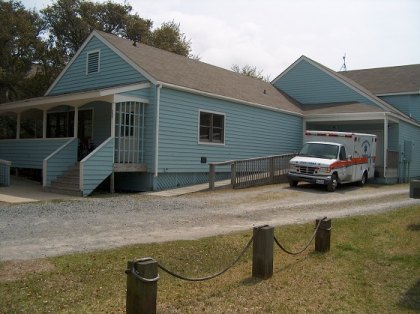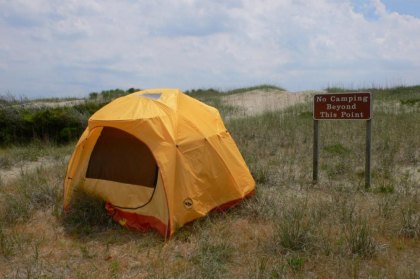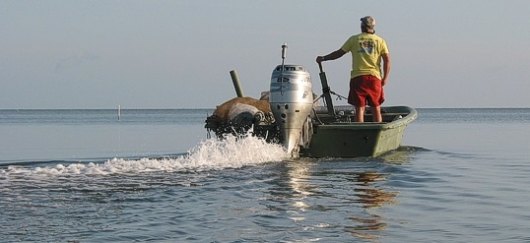At the April 9 Occupancy Tax Board meeting, fourteen local non-profits and groups requested between $1200 and $140,000 to support the work they do. A total of $451,000 was requested.
Local organizations that provide vital services to residents and visitors are sustained by a tremendous amount of volunteer work, observed meeting attendee Tom Pahl.
An appointed five member board of Ocracoke residents recommends how to distribute the money generated by the occupancy tax. North Carolina law says it can be spent "for any public purpose," and the final decision rests with Hyde County's five elected Commissioners. Finance officer Corrinne Gibbs projects that between $377,000 and $380,000 will be in the fund by the end of the fiscal year on June 30.

The Ocracoke Civic and Business Association, Ocracoke Health Center, and Ocracoke Volunteer Fire Department traditionally have been the largest beneficiaries of the tax, collectively accounting for 1.9 million of revenues over the last nine years.
"39% of the occupancy tax goes to fund the Health Center," noted occupancy tax board chair Wayne Clark.
Health Center Administrative Director Cheryl Ballance said for-profit medical companies have no interest in running Ocracoke's only clinic. "Nobody really wants to buy into a losing business," she observed. Ballance said their expenses run about $600,000 per year. Patient revenues cover close to $222,000 of that cost. They balance their sheets with critical needs grants from the state, and occupancy tax funds. The Health Center requested $140,000.
The island's medical center is planning to merge into one corporation with the Engelhard Medical Center on the mainland. This will allow the clinics to share purchasing power, a medical director, and administrative costs. The facilities are "the only two clinics that receive operational funding from the state," noted Ballance.
Ballance hopes the merger means the amount of occupancy tax funds requested by the Health Center will be lower in the future. With the mainland medical center as part of the equation, the board will pursue federal grants designated to provide care for special populations, like migrant workers.
If occupancy tax and grant funds do not come through, cutting hours at the center is their best option to control costs. "Our cash position is short. It's been that way for years," said Ballance.
OCBA made the second largest request, for $84,500. OCBA recently hired a Director of Tourism, a ten hour per week job that they would like to see grow, said Treasurer Carol Pahl. Part of their request funds the annual July 4th celebrations. A large chunk--$30,500--would enhance public toilet facilities in the village. OCBA envisions replacing port-a-johns with larger, storm water approved vault restrooms with sinks. The funds would also pay for cleaning services for the restrooms.
The 45 people gathered applauded the announcement by OVFD Treasurer Teresa O'Neal that they "signed a contract today" for construction of a new fire house.
Board member Martha Garrish noted that OVFD's request for $80,000 was "pretty much like last year."
"We're consistent," agreed O'Neal. "We could not survive without support from you all, and fundraising."
$50,000 would go into the OVFD building fund, which stands at $973,000 after years of adding fundraising and occupancy tax dollars to the account. $30,000 helps them cover operational expenses for the all volunteer department, which levies no fees on property owners. Fundraising, volunteerism and donations account for over 60% of the building fund balance.
"OVFD generates a lot of money in addition to what they ask for," said Clark.

As do other island non-profits. The next large project the Occupancy Tax Board appears ready to support is a Community Park and recreational fields. The Ocracoke Youth Center contracted to purchase a $1.2 million tract of land in 2012. They requested $54,000 in occupancy tax funds. $48,000 will allow them to meet their monthly payments. The remaining $6000 will cover legal costs. They plan to make a similar request for the life of the loan.
Their goal is to have the field "playable by the end of summer. Not completed, but usable," said OYC Board Chair Bob Chestnut.
Over $320,000 in cash and donations of labor and materials have already been committed, even before the capital fundraising drive kicks off.
"We're planning on raising $250,000 next year," said Chestnut. The committee is interviewing grant writers and development specialists who can help direct the campaign.
Committee member Greg Honeycutt said the Community Park will enhance shoulder season tourism, and is "the last piece of green space that can be used for multiple things."
The Community Center was purchased using occupancy tax funds. Their board requested $37,250. $17,250 of that would be designated for operations, and $20,000 would be used to make capital improvements to the building. Board Chair Barbara Jemison would like to bring the wiring up to code, and make the space more welcoming to multiple users.
Ocracoke Child Care requested $17,277.
"Our income is mainly donations, fundraisers, and parent fees. We spend more each month than we're getting in," said OCC Director Jennifer Daniels. The OCC Board of Directors would like to have several larger fundraisers that generate $12,000 in revenues, rather than smaller, monthly fundraisers that typically earn three to four hundred dollars for the center.
The OCC Board proposed a splish and splash carnival, to be held on and around July 4th. Inflatable water slides, a PVC water park, climbing walls, and bazooka water battles would be hosted at varying sites throughout the village.
"It's hot on the fourth of July," observed Daniels, "This would be something for everyone to enjoy." Wristbands permitting entry to the sites would be available for $25-$30, and the center hopes a $6000 initial investment from the occupancy tax board will help them raise close to $9000. Some of the water park infrastructure would then be owned by OCC for future use.
"With all that goes on that's free [on July 4th], will people pay?" asked occupancy tax board member Frank Brown.
OCC Board member Sandy Morris said a water carnival at the NC Seafood Festival charging a similar price for wristbands, "is full from morning to night."
Randy Hignite of the Hyde Chamber of Commerce requested $10,000 to help with costs of printing and distributing maps and publications that promote both mainland Hyde and Ocracoke.
"The Ocracoke community at large may not know exactly what we do. We want to be available," said Hignite. The Hyde Chamber hosts luncheons, gives out tourism awards, and creates and promotes special events to draw visitors, especially in the off season. They recently acquired a building on NC 264, and have "a very active board, interested in helping Ocracoke," he said.

The Ocracoke Working Watermen's Association made its first request ever of the occupancy tax board. The non-profit collective of fishermen and women has a fish house and a storefront on the harbor.
"It sets and maintains a quaint fishing village image. It benefits every business in the community," noted Director Hardy Plyler.
The $10,000 would pay for a dish washing system and cleaning tables on the docks that would help them meet sanitation requirements.
"Current projects will lead to value added projects. The fish house gives local watermen a place to sell their catch," said Plyler. The organization generates up to $500,000 a year for 35 local full and part time fishermen.
The wholesale body of OWWA breaks even, and the for-profit retail fin, the Ocracoke Seafood Company, pays the bills, said Plyler. Last year was the first year in its seven year history that it suffered a loss, meaning fishermen gave up some of their margin of profit.
"With this help, we can operate more efficiently, and not incur a loss," said Plyler.
OWWA board member David Hilton said that the capital improvements funded by the request "will last a long time, and provide consistency."
The Scenic Byway Committee made its final request, for $6625 of occupancy tax funds. The National Scenic Byway Program has been dissolved, but plans that are in place to promote attractions along the Outer Banks are moving forward. NCDOT will place Scenic Byway signs this fall, and informational kiosks in the spring of 2014.
Melinda Sutton said the Board of Commissioners is being asked for $6625 as well, to cover Hyde's commitment. Neighboring Carteret and Dare Counties have deeper pockets, and pay for the program from their general funds. Carteret and Dare both levy a 5% occupancy tax, generating 40% more income than Hyde's 3% tax.
The Ocrafolk Festival attracts 3000 visitors each June, many of whom extend their visit to include the weeks surrounding the three day festival, said organizer David Tweedie. $20,000 of the $58,000 budget is spent "right back here in the community and Eastern NC," he said. Festival organizers requested $4500, less than 10% of their budget.
While it is "great that it's grown," the festival now requires significant infrastructure and labor to produce. "As much as we love the festival, it's kind of taking over our lives," said Tweedie.
The budget doesn't reflect the "tremendous" amount of volunteer hours that go into producing the event, said Ocracoke Alive Board member Tom Pahl.
Now in its 14th year, organizers are exploring ways to generate more revenue by encouraging attendees to purchase admission buttons. The Friday night pot luck is being replaced with a $15 per plate meal.
Will the Pirate Jamboree happen in 2013?
"Unfortunately we've been hurricane-ed out the last two years. With the road out, we couldn't reschedule," said Connie Leinbach. Pirate Jamboree organizers plan to bring a group of living history actors to the island over the last weekend in October. The pirates will establish an educational encampment, and there will be wooden ships and cannons and muskets and battles. And pirates.
The Jamboree will span Ocracoke and Hatteras Islands, looking ahead to a larger event in 2018, the 300 year anniversary of the rogue Blackbeard's death.
A total of $15,500 in occupancy tax funds was given to help fund the Jamborees that were cancelled due to storms in 2011 and 2012. Leinbach requested $2520 to add to that balance. "We can still put on a great event," she said.
The British Cemetery Committee requested $2100 to host the annual ceremony and reception.
Ocracoke Preservation Society requested $1500 to enhance their web presence and train their staff. The historic society plans to add audio and video of old timers, storytellers, musicians to their site.
Friends of the Library asked for $1200 to fund a small addition.
The occupancy tax board will meet in the next few weeks to evaluate the requests and make their recommendations, which must be submitted to the Commissioners by April 30.
Former Chair Stella O'Neal shepherded the board for almost 20 years. She will be missed, said Clark. "She was a firm decision maker, but she led by consensus. The benefit to the community was always her guiding force."
Frank Brown and Clayton Gaskill were appointed to the board by OCBA, joining Clark, Trudy Austin, and Martha Garrish.
Listening to the requests with the intent of deciding which are most deserving "is awfully interesting after all those years of being on the other side of the table," said Brown.